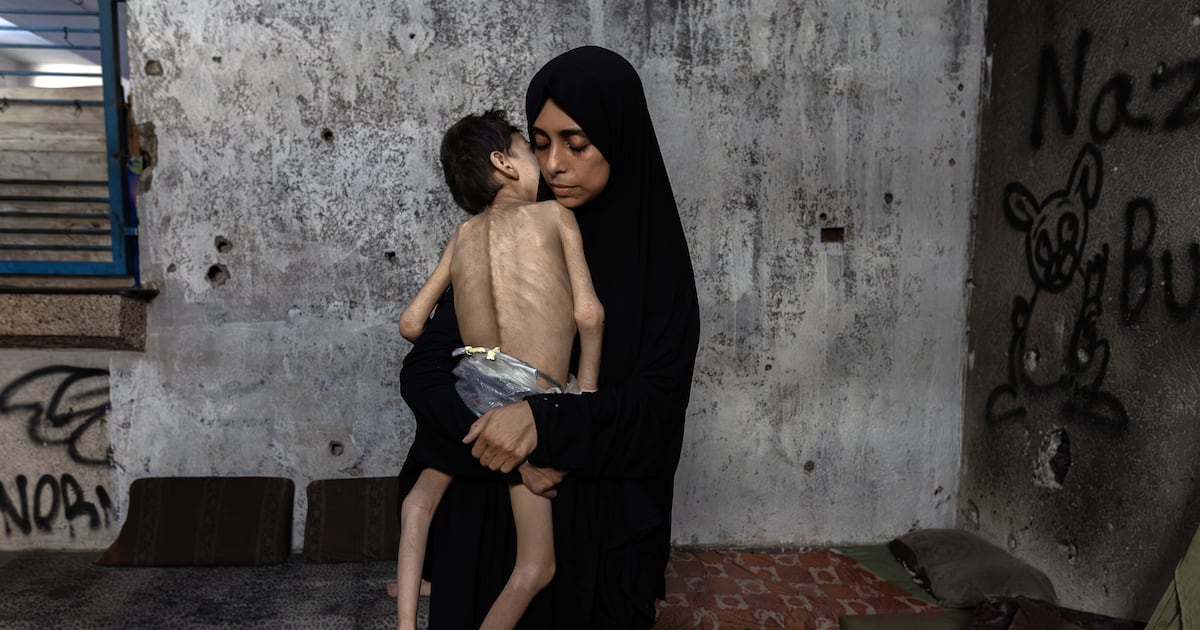Politics
Gaza Faces Catastrophic Hunger Crisis as Global Action Lags

The humanitarian crisis in Gaza has reached alarming levels, with reports indicating widespread starvation among the population. More than two months after the Israeli government-controlled Gaza Humanitarian Foundation (GHF) commenced operations, over 100 organizations, including ActionAid, have issued a stark warning about the escalating hunger crisis. They are calling on global governments to take immediate action to address the dire situation.
Conditions in Gaza have deteriorated sharply, with daily massacres reported at GHF food distribution sites, resulting in over 1,000 deaths due to starvation. Thousands more have sustained injuries in the scramble for food. The ongoing conflict has forcibly displaced nearly two million Palestinians, following a mass displacement order issued on July 20, 2023, confining residents to less than 12 percent of Gaza’s territory.
Access to essential resources remains severely restricted. Large quantities of food, clean water, medical supplies, and other necessities are trapped in warehouses just outside Gaza, as humanitarian organizations are blocked from delivering aid. According to affected parties, Israeli government restrictions and delays have created chaos and exacerbated the crisis, leading to widespread malnutrition and illness. Acute watery diarrhoea is spreading rapidly, markets stand empty, and humanitarian efforts are unable to meet the needs of the population.
Despite efforts, aid distributions in Gaza average only 28 trucks per day, which is grossly insufficient for the region’s more than two million residents. Many families have gone weeks without assistance, while the Integrated Food Security Phase Classification report indicates that more than 90 percent of Gaza’s population is facing crisis-level or catastrophic levels of food insecurity.
Alaa Abu Samara, Gaza emergency response manager for ActionAid Palestine, described the heartbreaking scenes in his home city of Deir al-Balah, where malnourished children are common. He noted that many children appear sunken-eyed and limp, with older children walking in a daze, too fatigued to play or even cry. The images of emaciated bodies have flooded international media, yet decisive action from global leaders remains elusive.
The crisis is not merely a statistic; it is a daily reality for families struggling to survive. According to Abu Samara, 113 people have died from starvation since October 2023, with 81 of those being children. This situation transcends a mere warning of famine; it is an active famine claiming lives. Families count themselves fortunate if they manage to secure one meal per day, and fresh produce has become nearly impossible to find. Prices for basic items have skyrocketed, with a kilo of tomatoes now costing up to $30.
For infants, the situation is even more dire. Baby formula is scarce and often expired, forcing desperate parents to mix sugar and flour into water to sustain their newborns. This practice poses significant health risks, yet parents are left with few alternatives.
Abu Samara expressed the dual burden he faces—as a father and a humanitarian worker. He struggles to provide for his three children while attempting to aid local communities with limited resources. The prevailing fear has shifted from airstrikes to starvation, with neighbors expressing a preference for a quick death over the prolonged suffering of hunger.
Despite the gravity of the situation, international responses have largely been inadequate. World leaders issue statements and pass resolutions, but the violence continues, and borders remain largely closed. As the crisis deepens, the call for action becomes more urgent.
Abu Samara called for immediate measures, urging governments to demand a permanent ceasefire, lift bureaucratic restrictions, open land crossings, and restore a principled, UN-led humanitarian response. He emphasized the need for states to take concrete steps to end the siege, including halting the transfer of weapons and ammunition.
The recent announcement of airdrops by the Israeli government has been criticized as a superficial response to a complex crisis, failing to address the systemic issues at play. Abu Samara articulated the frustration felt by many, questioning what it will take for meaningful action to be taken.
He concluded with an urgent plea: the people of Gaza do not require pity; they demand action. The need for food, medicine, and clean water is critical. As the world watches the catastrophe unfold, the time for decisive action is now, before it is too late.
-

 Top Stories4 weeks ago
Top Stories4 weeks agoTributes Surge for 9-Year-Old Leon Briody After Cancer Battle
-

 Entertainment2 months ago
Entertainment2 months agoAimee Osbourne Joins Family for Emotional Tribute to Ozzy
-

 Politics2 months ago
Politics2 months agoDanny Healy-Rae Considers Complaint After Altercation with Garda
-

 Top Stories2 months ago
Top Stories2 months agoIreland Enjoys Summer Heat as Hurricane Erin Approaches Atlantic
-

 World3 months ago
World3 months agoHawaii Commemorates 80 Years Since Hiroshima Bombing with Ceremony
-

 Top Stories3 months ago
Top Stories3 months agoFianna Fáil TDs Urgently Consider Maire Geoghegan-Quinn for Presidency
-

 World3 months ago
World3 months agoGaza Aid Distribution Tragedy: 20 Killed Amid Ongoing Violence
-

 World3 months ago
World3 months agoCouple Convicted of Murdering Two-Year-Old Grandson in Wales
-

 Top Stories4 weeks ago
Top Stories4 weeks agoNewcastle West Woman Patricia Foley Found Safe After Urgent Search
-

 Top Stories2 months ago
Top Stories2 months agoClimbing Errigal: A Must-Do Summer Adventure in Donegal
-

 Top Stories2 months ago
Top Stories2 months agoHike Donegal’s Errigal Mountain NOW for Unforgettable Summer Views
-

 World3 months ago
World3 months agoAristocrat Constance Marten and Partner Convicted of Infant Murder









